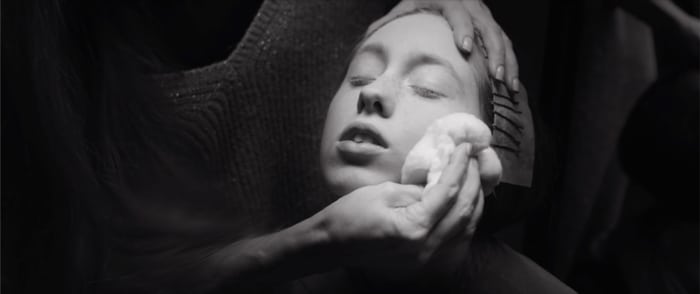



Dir.: Juja Dobrachkous; Cast: Anastasia Davidson, Anushka Andronikashvili, Anastasia Chanturaia, Guliko Gurgenidze; UK/Georgia 2020, 113 min.
This first feature film from Russian born Juja Dobrachkous is a visually stylish and evocative drama tracing three generations of Georgian women with a timelessness reminiscent of classical Russian cinema.
Ariadna (Davidson) works as a model in Tbilisi and is still suffering from her traumatic experiences at boarding school and the female influences in her life. The sudden death of her grandmother Bebia (Gurgenidze) forces her to confront the past returning to the village where she grew up, at odds with her both the women, particularly her mother (Chanturia).
When she finally gets to the village Ariadna realises nothing has changed as far as her mother concerned – she is in the throes of a second divorce, having driven Ariadna’s father away. Tradition dictates that as the youngest member of her grandmother’s family, Ariadna must now unite Bebia’s soul (she died in the hospital) with her home 25 kilometres away, by means of a connecting thread. Dato, the village elder, explains to Ariadna how to go about her task, asking Temo (Gurgenidze) to accompany her on the trip. But for some reason the two don’t get on, Ariadna accusing him of pushing his luck, despite his rather calming presence during their eventful journey to fix the thread.
Turbulent storms enliven their exhausting journey and presents challenges, mirroring their emotional conflict, particularly when a violent storm sees Ariadna fighting to save the barn where she and Temo take shelter. It soon emerges that Temo has had his own share of family difficulties, having run away from home after finding out out his mother was raped by a local bandit; his father, the country’s attorney general, failing to bring charges fearing for his own position: “In the end, I hated them both equally” claims Temo.
Rather than presenting village life as a calming retreat from the big city, the rural setting merely brings back bad memories for Ariadna, Georgia’s rugged countryside serving as a metaphor for her troubled past, as she reflects on her life in Tbilisi wondering why on earth she is going back to place that only brought trouble: “This is the 21st century, why am I doing this?”
Ariadna is annoyed to find out she has inherited her grandmother’s house “I do not want the house, as I did not want her dresses as a child, or her fine stockings, I became a model to prove that I was beautiful, and that she was wrong.” After the wake, she tells Temo that it was all a delusion: “The train cut the thread. We did it all for nothing, Bebia’s soul is lost”. But worse is to come when she discovers her mother has fallen ill.
DoP Veronica Solovyeva’s magic black-and-white images, full of poetry, yearning and loss, save the often nebulous feature from being an “atmospheric” pretence, making great use of light and shadow with subtle chiaroscuro camerawork.
Dobrachkous’ narrative is strong on detail, but leaves us too often in the dark as to its thematic concerns. The sequences from the boarding school, wonderfull as they are, do not really explain why Ariadne suffered, or how she got a nasty injury on her arm. The nonlinear narrative muddies the story, making us feel an even more urgent need for structure. The ensemble acting is wonderful, Davidson always finding the right tone of disquiet with her family and herself in this graceful study of matriarchal discontent. AS
ROTTERDAM FILM FESTIVAL 2021 | 6 February 2021